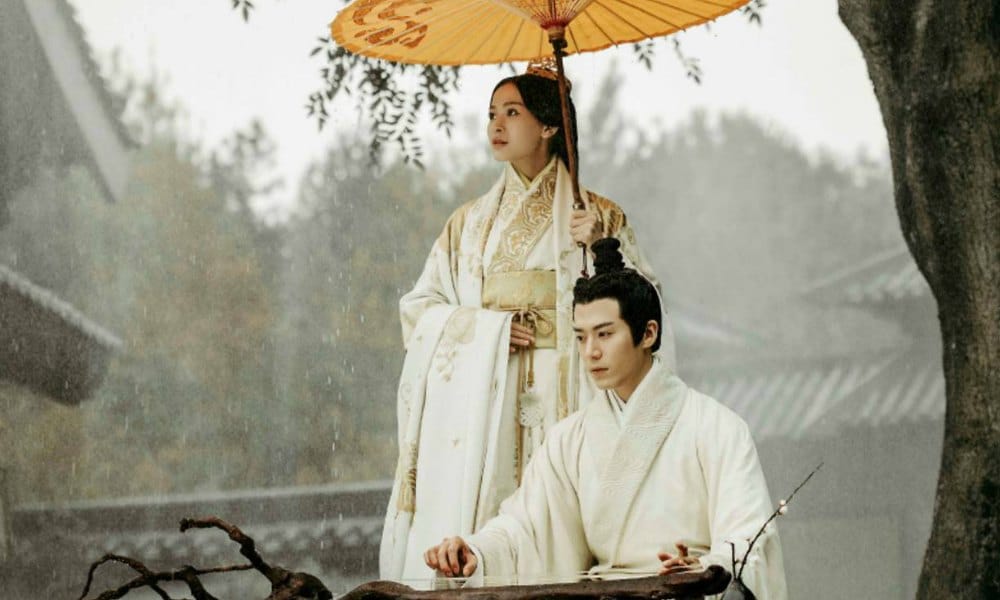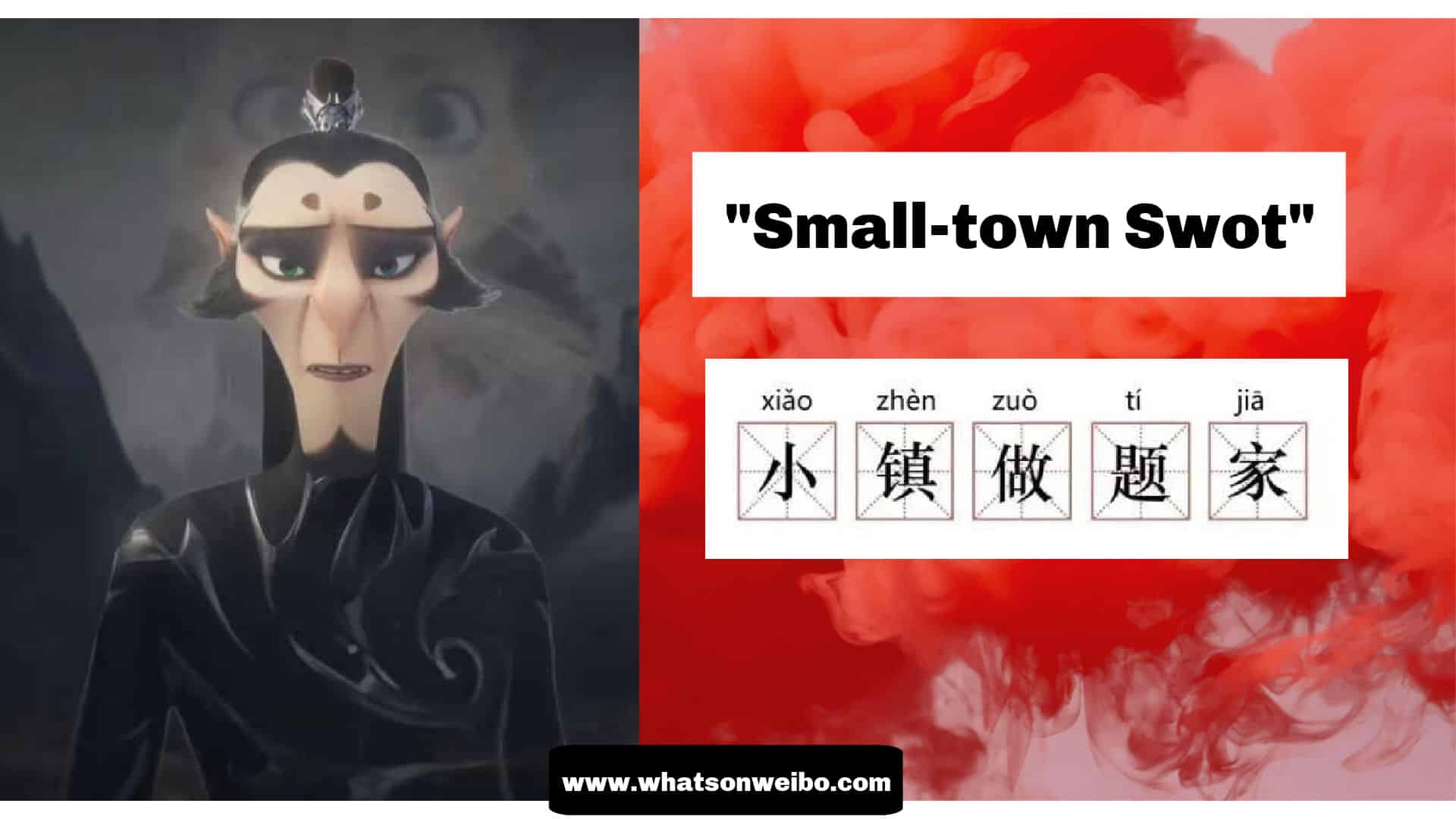China Arts & Entertainment
Top 10 Overview of China’s Most Popular TV Dramas February 2019
The top scoring TV dramas in China of this moment, winter 2018/2019.
Published
6 years agoon
By
Gabi Verberg
First published
From beautiful costume series to suspenseful war-themed productions – these are the most popular TV dramas in China this season, an overview by What’s on Weibo.
For newer articles on Chinese TV dramas, please check our overview here!
China has one of the most booming TV drama industries in the world, with dozens of new dramas being released every month, drawing in millions of viewers through the country’s most popular online video streaming platforms.
We’ve compiled a top ten of the most popular Chinese TV dramas of this moment, based on the current popular charts of the leading websites in Chinese online video, including Tencent Video, iQiyi, Sohu, Youku, LeTV, 360kan, Sogou Video, along with Baidu’s and Weibo’s popular TV drama charts.
Please note that this list has been compiled by combining the top-ranking lists of this moment. And we have chosen to exclude popular drama series that already made it in our previous top-ten lists (here, here, here), despite their ongoing popularity.
Most of these series are available for viewing online, some also with English subtitles. If you need a VPN to circumvent any geo restrictions, we recommend either NordVPN or ExpressVPN to do so. Note: also see our Top 30 of all-time classic Chinese TV Dramas here!
Here we go:
#10 Mystery of Antiques 古董局中局

China Mainland
Chinese title: Gǔdǒng jú zhōng jú 古董局中局
Genre: Suspense, Mystery
Directed by: Wu Bai (五百) aka Guo Shubo (郭书博), Yu Qing (余庆)
Episodes: 36, December 2018, Tencent Video
Mystery of Antiques is an adaption of the like-named novel by award-winning novelist Ma Boyan (马伯庸). The main character in the drama series is played by Xia Yu (夏雨), who previously won awards for acting at various film festivals from Venice to Beijing, and from Taiwan to Singapore.
The series currently ranks fourth on Baidu’s most popular drama list, and seventh on the 360kan most popular series rankings.
The drama tells the story of the ordinary small antique shop owner, Xu Yuan (Xia Yu), who comes from a family of antique traders. One day, a visitor coming to the shop brings Xu into a conspiracy that goes beyond his wildest dreams and links him to a legendary treasure. It is the start of a dangerous and tumultuous journey, in which Xu does all he can to clear his family’s name and change his fate.
On Weibo, the official account of the series has over 20.000 followers.
The show, in Chinese, is available on QQ.
#9 Forty Years We Walked 我们的四十年

China Mainland
Chinese title: Wǒmen de sìshí nián 我们的西十年
Genre: Coming of age
Directed by: Wang Zi (王梓)
Episodes: 60, November 2018, Jiangsu TV, iQiyi, Tencent Video, Sogou Video, Mango TV, LeTV, Fun TV, PP TV, Youku
This coming of age story, featuring beautiful images of Beijing, is directed by Hunan-born filmmaker Wang Zi. Wang was born in 1986 and started his career as an actor in 2008. Some say that this series is very much based on Wang’s own experiences in his journey to becoming a director.
The series is currently the second most popular series on Sogou Video.
Forty Years We Walked tells the life story of Feng Dou, who falls in love with television and film from the first time he ever sees a TV at his friend’s house. In middle school, he becomes well-known together with his friend for collecting old tv-parts and building “new” televisions from them. Feng continues to pursue his passion for tv, setting up several businesses. However, as he Feng gets older, he starts to question his purpose in life until he realizes what it is he was always intended to do.
On Weibo, the official account of the series is currently nearing 20.000 followers.
The show is available on AsiaTVSub here or on Youtube here with Chinese subtitles.
#8 Well Intended Love 奈何BOSS要娶我

China Mainland
Chinese title: Nàihé BOSS yào qǔ wǒ (奈何BOSS要娶我)
Genre: Drama, Romance
Directed by: Wu Qiang (吴强)
Episodes: 20, January 2019, Sohu Video TV, Mango TV
Well Intended Love, that features the youngest cast within this overview, including Xu Kaiwei (徐开骋, 1990) and Simona Wang (王双, 1991), tells the love story between a wealthy man and mostly unknown young actress. The series is currently the most popular drama series on Sohu Video.
The series revolves around undiscovered actress Xia Lin who is suffering from leukemia. To afford a surgery that can save her life, she gets involved with the wealthy CEO Ling Yizhou. At the same time, Xia continues to pursue her career as an actress. Ling and Xia eventually get married and live a happy life together in secrecy until Ling finds out that Xia has a hidden agenda.
On Weibo, the official account of the series has over 190.000 followers.
See the complete series including English and Chinese subtitles on YouTube here.
#7 The Legend of Hao Lan 皓镧传

China Mainland
Chinese title: Hào lán chuán 皓镧传
Genre: Costume Drama, War, Romance, Historical Fiction
Directed by: Li Dachao (李达超)
Episodes: 62, January 2019, iQiyi
The historical drama The Legend of Hao Lan, starring Wu Jinyan (吴谨言), Mao Zijin (茅子俊), and Nie Yuan (聂远), chronicles the rise of Li Hao Lan to become the Empress Dowager of the Qin dynasty, after a long drawn battle between Zhao and Qin, towards the end of the Warring States period (475–221 BC).
The series is currently ranked third most popular series on 360kan and fourth most popular on iQiyi. Viewers of the latter evaluate the series with an average of 7.0.
Its popularity shows that historical drama is still very much booming in China’s drama industry. Recently, state media critique on period costume dramas that focus on conflicts in the imperial court became a hot topic on Chinese social media. The criticism singled out Yanxi Palace in particular, a show that was then canceled on TV for its “negative impacts,” signaling heightened censorship on Chinese costume dramas.
For now, however, The Legend of Hao Lan is going strong – and it stars the same main characters (Wu Jinyan and Nie Yuan). It depicts the story of the brave woman Li Hao Lan, daughter of Imperial censor Li He of Zhao state, who gets framed by her stepmother and is sold as a slave to Lu Buwei. Lu later presents her as a gift to Sun Yiren, a Qin royal that resides in Zhao as a hostage. As Li and Lu arrive in the royal Zhao palace, they unite and start their battle for power.
On Weibo, the official account of the series has over 40.000 followers.
See the complete series including Chinese subtitles here. Also available on Viki (incl. English subtitles).
#6 Candle in the Tomb: The Wrath of Time 鬼吹灯之怒晴湘西

China Mainland
Chinese title: Guǐ chuīdēng zhī nù qíng xiāngxī (鬼吹灯之怒晴湘西)
Genre: Adventure, Suspense
Directed by: Fei Zhengxiang (费振翔), supervised by Guan Hu (管虎)
Episodes: 21, January 2019, Tencent Video
The Wrath of Time is the third season in the fictional Candle in the Tomb series, an adaption from the novels by Zhang Muye. The series chronicles the adventures of a gang of tomb raiders as they excavate the truth behind a mysterious curse. Previous seasons were Candle in the Tomb: Mu Ye Gui Shi (鬼吹灯之牧野诡事) and Candle in the Tomb: The Weasel Grave (鬼吹灯之黄皮子坟). Despite this series being the third season, it’s not really necessary to see the first series to understand the third season.
The series, starring Pan Yueming (潘粤明), Gao Weiguang (高伟光), and Xin Yulei, currently ranks third most popular drama series on Tencent Video scoring a 9.3, and fourth most popular serie on 360kan.
This third season of the Candle in the Tomb series is set in a time when the warlords are fighting for power and bring disaster upon the people. With the purpose of finding the ancient tombs from the Yuan dynasty, tomb raider Chen Yulou and warlord Luo Laowai embark on a journey to the Xiangxi Mountains. On their way, they meet Zhe Gushao, who is set on finding a pearl that will end the spell upon his clan. Despite the mutual suspicion of each other’s motives, Chen and Zhe rely on each other to get to their destination.
The third season does not have an official account on Weibo, however that the series is quite popular can be seen from the hashtag “Candle in the Tomb: The Wrath of Time” (#鬼吹灯之怒晴湘西#) which already got over 690 million views, and received more than 2.3 million comments on Weibo.
See the complete series including English and Chinese subtitles here.
#5 Behind the Scenes 幕后之王

China Mainland
Chinese title: Mùhòu zhī wáng (Mùhòu zhī wáng)
Genre: Drama, Romance
Directed by: Li Jun (李骏)
Episodes: 42, January 2019, Youku TV, Dragon TV, Beijing TV
Behind the Scenes, starring Zhou Dongyu (周冬雨) and Luo Jin (罗晋), is currently ranking second place on Weibo’s top ten most popular TV dramas, and third on Youku’s top 10 TV drama series.
The series revolves around ambitious student Bu Xiaogu and the famous producer Chun Yuqiao. Bu is thrilled when she is given the opportunity to work with the man she greatly admires. But she quickly discovers that he is nothing like she imagined. With her hopes and dreams shattered, Bu gets involved in an accident. Chun unexpectedly takes on the sole responsibility for the accident, setting off a special relationship between the two.
On Weibo, the official account of the series has over 80.000 followers
See the complete series including Chinese subtitles here.
#4 Spy Hunter 天衣无缝

China Mainland
Chinese title: Tiānyīwúfèng (天衣无缝)
Genre: Action, Detective
Directed by: Li Lu (李路)
Episodes: 48, January 2019, Zhejiang TV, Jiangsu TV, Tencent Video, Youku, iQiyi, Mango TV
Spy Hunter, starring Lu Yi (陆毅) as one of the main characters, currently ranks second most popular drama series on both 360kan and iQiyi.
This fictional story takes place in the spring of 1931 when the Central Committee of the Communist Party of China is establishing logistic bases in several big cities. Two Special service teams try to establish a new secret underground route and depot. But one day, their secret base in Tianjin is exposed, and the life of agent Wan is sacrificed. In the name of justice, Wan’s brother goes looking for the truth behind his brother’s death.
On Weibo, the official account of the series has approximately 50.000 followers.
See the complete series including English and Chinese subtitles here.
#3 I Will Never Let You Go 小女花不弃

China Mainland
Chinese title: Xiǎonǚ huā bu qì (小女花不弃)
Genre: Costume Drama, Fantasy, Adventure
Directed by: Cha Chuanyi (查传谊)
Episodes: 51, January 2019, iQiyi, Tencent Video, Youku, PPTV
I’ll Never Let You Go is an adaptation of the like-named novel by Zhuang Zhuang (桩桩). The series stars many famous actors including Ariel Lin (林依晨), Lin Bohong (林柏宏), and Zhang Binbin aka Vin (张彬彬).
On Tencent Video the series currently occupies second place in their most popular drama series hotlist, scoring an average of 8.2. And also on Weibo, Youku, and 360kan, the series holds a position in the top five.
I’ll Never Let You Go is a coming-of-age story revolving around a young with a unique gift, who wanders the world alone after her entire family was killed to protect the girl’s special gift. One day, the girl meets a courageous masked man who saves her life, after which they fall in love. But everything turned around when the girl discovers who the man she loves really is.
On Weibo, the verified Weibo page of the series has over 4.6 million followers, making it the most popular series on Weibo of this list.
See the complete series with Chinese subtitles here. Also available on Viki (including English subtitles).
#2 Anti-Japanese 荡寇

China Mainland
Chinese title: Dàng kòu 荡寇
Genre: Drama, War, History
Directed by: Jiao Xiaoyu (焦晓雨)
Episodes: 60, November 2016, Guizhou TV, iQiyi, Sohu TV, PP TV, Youku
This TV drama, that has the remarkable English title ‘Anti-Japanese‘ (the original Chinese title roughly translates as ‘sweeping away the enemy’) was first aired by Hunan TV in November of 2016. Since then, it was broadcasted by at least eight different television stations and platforms.
The most recent rebroadcast started on January 19, 2019, and the numbers show that people still can’t get enough of the drama. On iQiyi, the series currently ranks first place, and on Sohu and LeTV the series ranks second and fourth place respectively.
The TV drama is set at the start of the War of Resistance again Japan (1937-1945). When an intelligence team of the Communist Party finds out about a box with classified information regarding the development chemical and biological weapons that is sent out by the Japanese army, Yang Erhu is sent to stop their evil plans and to protect his country.
See the complete series including Chinese subtitles here.
#1 The Story Of Minglan 知否知否应是绿肥红瘦

China Mainland
Chinese title: Zhī fǒu zhī fǒu yīng shì lǜféi hóng shòu (知否知否应是绿肥红瘦)
Genre: Historical fiction, Family, Politics
Directed by: Zhang Kaizhou (张开宙)
Episodes: 73, December 2018, iQiyi, Tencent Video, Youku, Youtube, Hunan TV
The fictional Story of Minglan, starring Zhao Liying (赵丽颖) and William Feng (冯绍峰) as main characters, is an adapted screenplay a novel by Chinese author Zheng Yi (郑怡) aka Guanxin Zeluan (关心则乱).
The series currently dominates the drama top charts, occupying the first place on Tencent Video, Youku, Baidu, Weibo, Sogou Video and 360kan.
The story of Minglan tells the coming of age story of an intelligent concubine daughter that has to grow up dealing with her unkind stepmother, an indifferent father, and unreasonable sisters.
Minglan learns to hide her skills and true intentions in order to survive until she meets Gu Tingyu, and the two fall in love. After Gu becomes a powerful official, and the two get married, Minglan rises to prominence.
On Weibo, the official account of the series has nearly 1.7 million followers.
See the complete series including Engish and Chinese subtitles here.
By Gabi Verberg
Spotted a mistake or want to add something? Please let us know in comments below or email us.
©2019 Whatsonweibo. All rights reserved. Do not reproduce our content without permission – you can contact us at info@whatsonweibo.com
Gabi Verberg is a Business graduate from the University of Amsterdam who has worked and studied in Shanghai and Beijing. She now lives in Amsterdam and works as a part-time translator, with a particular interest in Chinese modern culture and politics.

China Arts & Entertainment
How K-pop Fans and the 13-Year-Old Daughter of Baidu VP Sparked a Debate on Online Privacy
What began as K-pop fan outrage targeting a snarky commenter quickly escalated into a Baidu-linked scandal and a broader conversation about data privacy on Chinese social media.
Published
5 days agoon
March 26, 2025By
Ruixin Zhang
For an ordinary person with just a few followers, a Weibo account can sometimes be like a refuge from real life—almost like a private space on a public platform—where, along with millions of others, they can express dissatisfaction about daily annoyances or vent frustration about personal life situations.
But over recent years, even the most ordinary social media users could become victims of “opening the box” (开盒 kāihé)—the Chinese internet term for doxxing, meaning the deliberate leaking of personal information to expose or harass someone online.
A K-pop Fan-Led Online Witch Hunt
On March 12, a Chinese social media account focusing on K-pop content, Yuanqi Taopu Xuanshou (@元气桃浦选手), posted about Jang Wonyoung, a popular member of the Korean girl group IVE. As the South Korean singer and model attended Paris Fashion Week and then flew back the same day, the account suggested she was on a “crazy schedule.”
In the comment section, one female Weibo user nicknamed “Charihe” replied:
💬 “It’s a 12-hour flight and it’s not like she’s flying the plane herself. Isn’t sleeping in business class considered resting? Who says she can’t rest? What are you actually talking about by calling this a ‘crazy schedule’..”

Although the comment may have come across as a bit snarky, it was generally lighthearted and harmless. Yet unexpectedly, it brought disaster upon her.
That very evening, the woman nicknamed Charihe was bombarded with direct messages filled with insults from fans of Jang Wonyoung and IVE.
Ironically, Charihe’s profile showed she was anything but a hater of the pop star—her Weibo page included multiple posts praising Wonyoung’s beauty and charm. But that context was ignored by overzealous fans, who combed through her social media accounts looking for other posts to criticize, framing her as a terrible person.
After discovering through Charihe’s account that she was pregnant, Jang Wonyoung’s fans escalated their attacks by targeting her unborn child with insults.
The harassment did not stop there. Around midnight, fans doxxed Charihe, exposing her personal information, workplace, and the contact details of her family and friends. Her friends were flooded with messages, and some were even targeted at their workplaces.
Then, they tracked down Charihe’s husband’s WeChat account, sent him screenshots of her posts, and encouraged him to “physically punish” her.
The extremity of the online harassment finally drew backlash from netizens, who expressed concern for this ordinary pregnant woman’s situation:
💬 “Her entire life was exposed to people she never wanted to know about.”
💬 “Suffering this kind of attack during pregnancy is truly an undeserved disaster.”
Despite condemnation of the hate, some extreme self-proclaimed “fans” remained relentless in the online witch hunt against Charihe.
Baidu Takes a Hit After VP’s 13-Year-Old Daughter Is Exposed
One female fan, nicknamed “YourEyes” (@你的眼眸是世界上最小的湖泊), soon started doxxing commenters who had defended her. The speed and efficiency of these attacks left many stunned at just how easy it apparently is to trace social media users and doxx them.
Digging into old Weibo posts from the “YourEyes” account, people found she had repeatedly doxxed people on social media since last year, using various alt accounts.
She had previously also shared information claiming to study in Canada and boasted about her father’s monthly salary of 220,000 RMB (approx. $30.3K), along with a photo of a confirmation document.
Piecing together the clues, online sleuths finally identified her as the daughter of Xie Guangjun (谢广军), Vice President of Baidu.
From an online hate campaign against an innocent, snarky commenter, the case then became a headline in Chinese state media, and even made international headlines, after it was confirmed that the user “YourEyes”—who had been so quick to dig up others’ personal details—was in fact the 13-year-old daughter of Xie Guangjun, vice president at one of China’s biggest tech giants.
On March 17, Xie Guangjun posted the following apology to his WeChat Moments:

💬 “Recently, my 13-year-old daughter got into an online dispute. Losing control of her emotions, she published other people’s private information from overseas social platforms onto her own account. This led to her own personal information also getting exposed, triggering widespread negative discussion.
As her father, I failed to detect the problem in time and failed to guide her in how to properly handle the situation. I did not teach her the importance of respecting and protecting the privacy of others and of herself, for which I feel deep regret.
In response to this incident, I have communicated with my daughter and sternly criticized her actions. I hereby sincerely apologize to all friends affected.
As a minor, my daughter’s emotional and cognitive maturity is still developing. In a moment of impulsiveness, she made a wrong decision that hurt others and, at the same time, found herself caught in a storm of controversy that has subjected her to pressure and distress far beyond her age.
Here, I respectfully ask everyone to stop spreading related content and to give her the opportunity to correct her mistakes and grow.
Once again, I extend my apologies, and I sincerely thank everyone for your understanding and kindness.”
The public response to Xie’s apology has been largely negative. Many criticized the fact that it was posted privately on WeChat Moments rather than shared on a public platform like Weibo. Some dismissed the statement as an attempt to pacify Baidu shareholders and colleagues rather than take real accountability.
Netizens also pointed out that the apology avoided addressing the core issue of doxxing. Concerns were raised about whether Xie’s position at Baidu—and potential access to sensitive information—may have helped his daughter acquire the data she used to doxx others.
Adding fuel to the speculation were past conversations allegedly involving one of @YourEyes’ alt accounts. In one exchange, when asked “Who are you doxxing next?” she replied, “My parents provided the info,” with a friend adding, “The Baidu database can doxx your entire family.”
Following an internal investigation, Baidu’s head of security, Chen Yang (陈洋), stated on the company’s internal forum that Xie Guangjun’s daughter did not obtain data from Baidu but from “overseas sources.”
However, this clarification did little to reassure the public—and Baidu’s reputation has taken a hit. The company has faced prior scandals, most notably a the 2016 controversy over profiting from misleading medical advertisements.
Online Vulnerability
Beyond Baidu’s involvement, the incident reignited wider concerns about online privacy in China. “Even if it didn’t come from Baidu,” one user wrote, “the fact that a 13-year-old can access such personal information about strangers is terrifying.”
Using the hashtag “Reporter buys own confidential data” (#记者买到了自己的秘密#), Chinese media outlet Southern Metropolis Daily (@南方都市报) recently reported that China’s gray market for personal data has grown significantly. For just 300 RMB ($41), their journalist was able to purchase their own household registration data.
Further investigation uncovered underground networks that claim to cooperate with police, offering a “70-30 profit split” on data transactions.
These illegal data practices are not just connected to doxxing but also to widespread online fraud.
In response, some netizens have begun sharing guides on how to protect oneself from doxxing. For example, they recommend people disable phone number search on apps like WeChat and Alipay, hide their real name in settings, and avoid adding strangers, especially if they are active in fan communities.
Amid the chaos, K-pop fan wars continue to rage online. But some voices—such as influencer Jingzai (@一个特别虚荣的人)—have pointed out that the real issue isn’t fandom, but the deeper problem of data security.
💬 “You should question Baidu, question the telecom giants, question the government, and only then, fight over which fan group started this.”
As for ‘Charihe,’ whose comment sparked it all—her account is now gone. Her username has become a hashtag. For some, it’s still a target for online abuse. For others, it is a reminder of just how vulnerable every user is in a world where digital privacy is far from guaranteed.
By Ruixin Zhang
Independently covering digital China for over a decade. Like what we do? Support us and get the story behind the hashtag by subscribing:
edited for clarity by Manya Koetse
Spotted a mistake or want to add something? Please let us know in comments below or email us. First-time commenters, please be patient – we will have to manually approve your comment before it appears.
©2024 Whatsonweibo. All rights reserved. Do not reproduce our content without permission – you can contact us at info@whatsonweibo.com.
China Memes & Viral
How Ne Zha 2’s Shen Gongbao Became Known as the Ultimate “Small-Town Swot”
Published
4 weeks agoon
March 1, 2025
PART OF THIS TEXT COMES FROM THE WEIBO WATCH PREMIUM NEWSLETTER
Over the past few weeks, the Chinese blockbuster Ne Zha 2 has been trending on Weibo every single day. The movie, loosely based on Chinese mythology and the Chinese canonical novel Investiture of the Gods (封神演义), has triggered all kinds of memes and discussions on Chinese social media (read more here and here).
One of the most beloved characters is the leopard demon Shen Gongbao (申公豹). While Shen Gongbao was a more typical villain in the first film, the narrative of Ne Zha 2 adds more nuance and complexity to his character. By exploring his struggles, the film makes him more relatable and sympathetic.
In the movie, Shen is portrayed as a sometimes sinister and tragic villain with humorous and likeable traits. He has a stutter, and a deep desire to earn recognition. Unlike many celestial figures in the film, Shen Gongbao was not born into privilege and never became immortal. As a demon who ascended to the divine court, he remains at the lower rungs of the hierarchy in Chinese mythology. He is a hardworking overachiever who perhaps turned into a villain due to being treated unfairly.
Many viewers resonate with him because, despite his diligence, he will never be like the gods and immortals around him. Many Chinese netizens suggest that Shen Gongbao represents the experience of many “small-town swots” (xiǎozhèn zuòtíjiā 小镇做题家) in China.
“Small-town swot” is a buzzword that has appeared on Chinese social media over the past few years. According to Baike, it first popped up on a Douban forum dedicated to discussing the struggles of students from China’s top universities. Although the term has been part of social media language since 2020, it has recently come back into the spotlight due to Shen Gongbao.
“Small-town swot” refers to students from rural areas and small towns in China who put in immense effort to secure a place at a top university and move to bigger cities. While they may excel academically, even ranking as top scorers, they often find they lack the same social advantages, connections, and networking opportunities as their urban peers.
The idea that they remain at a disadvantage despite working so hard leads to frustration and anxiety—it seems they will never truly escape their background. In a way, it reflects a deeper aspect of China’s rural-urban divide.
Some people on Weibo, like Chinese documentary director and blogger Bianren Guowei (@汴人郭威), try to translate Shen Gongbao’s legendary narrative to a modern Chinese immigrant situation, and imagine that in today’s China, he’d be the guy who trusts in his hard work and intelligence to get into a prestigious school, pass the TOEFL, obtain a green card, and then work in Silicon Valley or on Wall Street. Meanwhile, as a filial son and good brother, he’d save up his “celestial pills” (US dollars) to send home to his family.
Another popular blogger (@痴史) wrote:
“I just finished watching Ne Zha and my wife asked me, why do so many people sympathize with Shen Gongbao? I said, I’ll give you an example to make you understand. Shen Gongbao spent years painstakingly accumulating just six immortal pills (xiāndān 仙丹), while the celestial beings could have 9,000 in their hand just like that.
It’s like saving up money from scatch for years just to buy a gold bracelet, only to realize that the trash bins of the rich people are made of gold, and even the wires in their homes are made of gold. It’s like working tirelessly for years to save up 60,000 yuan ($8230), while someone else can effortlessly pull out 90 million ($12.3 million).In the Heavenly Palace, a single meal costs more than an ordinary person’s lifetime earnings.
Shen Gongbao seems to be his father’s pride, he’s a role model to his little brother, and he’s the hope of his entire village. Yet, despite all his diligence and effort, in the celestial realm, he’s nothing more than a marginal figure. Shen Gongbao is not a villain, he is just the epitome of all of us ordinary people. It is because he represents the state of most of us normal people, that he receives so much empathy.”
In the end, in the eyes of many, Shen Gongbao is the ultimate small-town swot. As a result, he has temporarily become China’s most beloved villain.
By Manya Koetse, with contributions by Wendy Huang
Follow @whatsonweibo
Spotted a mistake or want to add something? Please let us know in comments below or email us. Please note that your comment below will need to be manually approved if you’re a first-time poster here.
©2025 Whatsonweibo. All rights reserved. Do not reproduce our content without permission – you can contact us at info@whatsonweibo.com
Subscribe

IShowSpeed in China: Streaming China’s Stories Well

How K-pop Fans and the 13-Year-Old Daughter of Baidu VP Sparked a Debate on Online Privacy

Squat or Sit? China’s Great Toilet Debate and the Problem of Footprints on the Seat

Weibo Watch: The Great Squat vs Sitting Toilet Debate in China🧻

Chinese Netizens Turn to Tim Cook Over Battery Factory’s Illegal Overtime

Our Picks: Top 10 Chinese Buzzwords and Phrases of 2024 Explained

“Dear Li Hua”: The TikTok/Xiaohongshu Honeymoon Explained

Beyond the Box Office: What’s Behind Ne Zha 2’s Success?

Weibo Watch: Christmas in China Is Everywhere and Nowhere

Weibo Watch: A New Chapter

15 Years of Weibo: The Evolution of China’s Social Media Giant

Tuning Into the Year of the Snake

The ‘China-chic Girl’ Image and the Realities of China’s Competitive Food Delivery Market

TikTok Refugees, Xiaohongshu, and the Letters from Li Hua

“Black Myth: Wukong”: From Gaming Screens to the CMG Spring Festival Gala?
Get in touch
Would you like to become a contributor, or do you have any tips or suggestions? Get in touch here!
Popular Reads
-

 China Insight11 months ago
China Insight11 months agoThe Tragic Story of “Fat Cat”: How a Chinese Gamer’s Suicide Went Viral
-

 China Digital10 months ago
China Digital10 months agoChina’s 2024 Gaokao Triggers Online Discussions on AI
-

 China Arts & Entertainment11 months ago
China Arts & Entertainment11 months agoSinging Competition or Patriotic Fight? Hunan TV’s ‘Singer 2024’ Stirs Nationalistic Sentiments
-

 China Arts & Entertainment12 months ago
China Arts & Entertainment12 months ago“Old Bull Eating Young Grass”: 86-Year-Old Chinese Painter Fan Zeng Marries 36-Year-Old Xu Meng







Pieter
May 30, 2019 at 11:01 am
Typo: Chinese title: Wǒmen de sìshí nián 我们的西十年
kc
September 21, 2019 at 5:10 pm
great list thanks